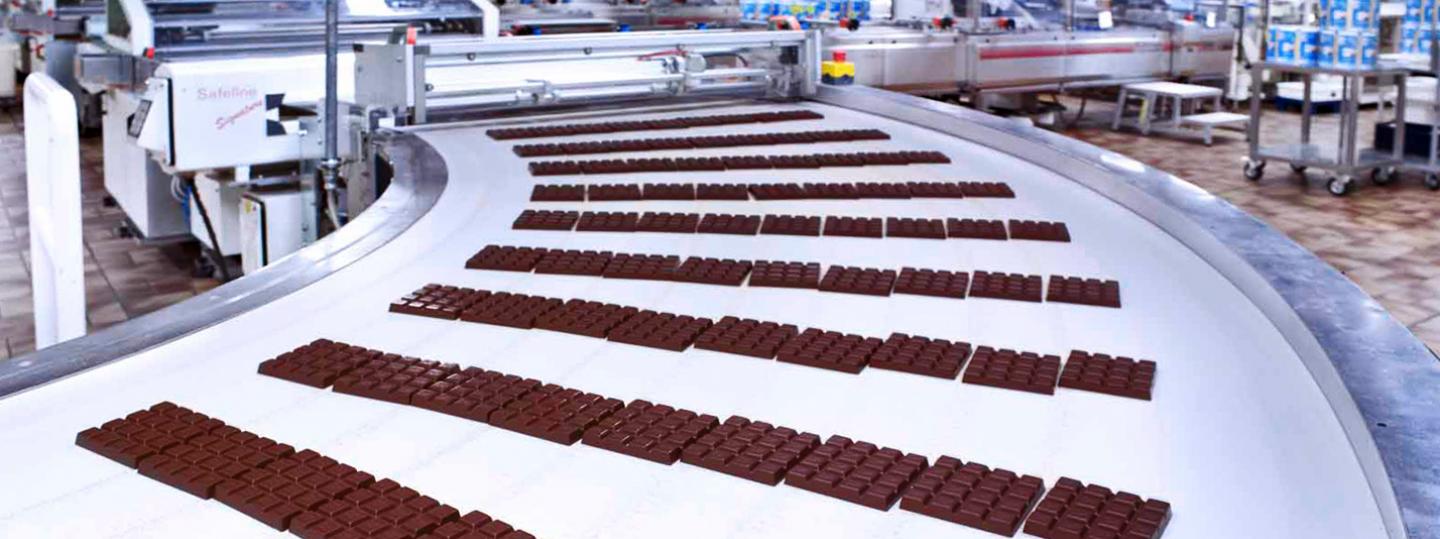
ENGIE Deutschland saves energy sustainably at Ritter Sport
Cologne - The colorful chocolate squares of Ritter Sport are world-famous; Alfred Ritter GmbH & Co. KG exports its delicacies to more than 100 countries from the only factory in the Swabian Waldenbuch. ENGIE Deutschland is also helping to ensure that chocolate production there is as energy-efficient as possible: The leading specialist for technology, energy and service implemented a comprehensive efficiency project on site to sustainably reduce energy consumption for the climate control of a production building measuring around 6,000 square meters in the long term. "We are delighted that we can use our expertise in energy saving measures for Ritter Sport. For us, this is a project of exemplary character for many food manufacturers," says Daniel Münch, energy management expert at ENGIE Deutschland and responsible for the project. "In the production of chocolate – as with many foods – precisely defined production conditions are essential. We at ENGIE Deutschland ensure that these conditions are met and that the energy consumption for air conditioning the building will be 50 percent lower in the future."
Less energy, less CO2
The family-owned company Ritter Sport, which currently employs around 1,600 people and generated sales of 480 million euros in 2019, commissioned ENGIE Deutschland with a complete package of various individual services for energy savings in a production building. This reduced the coordination effort for the chocolate manufacturer to a minimum. ENGIE Deutschland first developed a customized system concept with an investment volume of 445,000 euros, which optimally met the specific customer requirements. The team completed the planned measures on site within only eleven months. Meanwhile, production operations were able to continue without any production delays and in compliance with the highest requirements.
The experts from ENGIE Deutschland installed, among other things, volume flow controllers and temperature sensors distributed over 26 zones and four building levels in the factory, which now control the supply and exhaust air according to demand; this reduces the average air flow from 300,000 cubic meters/hour to around 165,000 cubic meters/hour. In addition, ENGIE upgraded the existing control technology by around 400 additional data points. These measures offer Ritter Sport several advantages at once: From now on, not only will the special room climate requirements be met more precisely, but energy consumption will also be significantly reduced.
The energy savings are impressive: The chocolate bar manufacturer reduced energy consumption for climatizing the production building by more than 50 percent, saving a total of 130,000 euros per year. Of this amount, 77,000 euros are for electricity, 26,000 euros for heating and 27,000 euros for cooling. In addition, the ecological footprint is significantly reduced by the measures: Year after year, Ritter Sport now saves more than 600 tons of CO2 – in line with ENGIE Deutschland's "Zero Carbon Transition as a Service" mission, under which the company has set out to support its customers in the transition to climate neutrality with precisely tailored services.
Funded by BMWI
As a result of this sustainable reduction in energy costs and CO2 emissions, Ritter Sport receives funding from the state: The Federal Ministry for Economic Affairs and Energy (BMWI) is supporting the measures to save electricity as a special example of energy efficiency in industry with a six-figure sum. The funding reduces the payback period for Ritter Sport by two years to a total of only three and a half years. ENGIE's experts were also responsible for the complete organization - from the application for funding to the proof of funding. The efficiency project started in February 2019, and ENGIE Deutschland completed all construction projects successfully in December 2019. Since February 2020, the subsidy and savings certificate has been available and Ritter Sport benefits from the projected energy and CO2 savings.
Square, practical, efficient: ENGIE Deutschland reduces the energy consumption of the Ritter Sport production building in Waldenbuch by more than 50 percent.
ENGIE Deutschland GmbH
 Bildquelle: Ritter Sport
Bildquelle: Ritter Sport